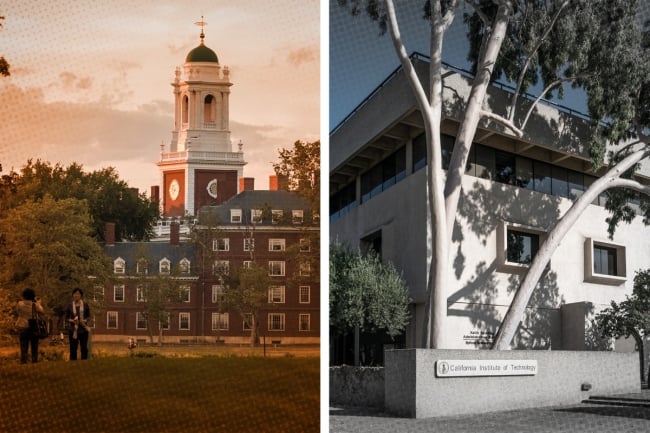You have /5 articles left.
Sign up for a free account or log in.

Harvard, left, and Caltech both announced Thursday they would return to requiring standardized test scores.
Photo illustration by Justin Morrison/Inside Higher Ed | Brooks Kraft/Getty Images | AaronP/Bauer-Griffin/Getty Images
Harvard University and the California Institute of Technology both announced yesterday that they will require standardized test scores starting this fall, returning to pre-pandemic policies.
Harvard is replacing a temporary test-optional policy, but Caltech was one of the only institutions to go fully test-blind at the start of the pandemic, meaning that since 2020 it has not considered scores even when they were submitted.
Harvard will accept alternatives to the SAT and ACT, such as Advanced Placement and International Baccalaureate test scores, but only in “exceptional cases.”
The decisions were a sudden about-face for the institutions, both of which had said they would extend their temporary policies for at least one more cycle: Caltech until fall 2025, and Harvard until fall 2026.
So why did they elect to reverse course and cement their testing policies now?
“What changed is the zeitgeist,” said Harry Feder, executive director of FairTest, a nonprofit advocacy group that opposes standardized testing.
Harvard and Caltech’s return to testing mandates follow a wave of other highly selective institutions doing the same, including Yale, Dartmouth and the University of Texas at Austin. Those colleges made their decisions following the publication of new research from the Harvard-based nonprofit Opportunity Insights, which touted test scores’ predictive power of future academic success. That reignited a dormant debate over the benefits of test requirements.
Feder believes the research—and the subsequent media blitz covering the revived debate—put pressure on other highly competitive institutions still mulling their post-pandemic testing policies
“They were nervous about the competition at their top level of admissions,” he said. “This is not based on some new academic data that takes a deep look into how test-optional has gone for them … it’s about reasserting their commitment to high academic standards, which their peer institutions have clearly established one cannot do without test scores.”
A Complete Reversal at Caltech
When Caltech extended its testing moratorium in 2022, it did so on the grounds that the correlation between test scores and academic success was small, and “appears to dissipate as students progress through the first-year curriculum,” as the university put it at the time.
“A consensus has developed among faculty and professional staff involved in admissions … that numerous other key attributes of applications serve as stronger indicators of the potential for student success here” Caltech professor Jared Leadbetter, chair of the institution’s first-year admissions committee, wrote in a statement at the time.
In a statement Thursday, university officials appeared to contradict their earlier assessment, writing that requiring scores “provides admissions officers and faculty reviewers useful information about academic preparedness.”
“We think it is critical that our admissions office and the faculty who are reviewing applicants have available to them all the information that could shape their understanding of a prospective student’s readiness for our rigorous academic programs,” Caltech’s faculty advisory committee on undergraduate admissions policy wrote in the announcement.
Shayna Chabner, Caltech’s chief communications officers, told Inside Higher Ed in an email that admissions data from the past four years showed “nearly all matriculated students had taken standardized tests”—more than 95 percent.
But she offered no additional data or internal research to back the reversal of the university’s view that test requirements can help ensure academic success. When asked about the apparently conflicting conclusion reached in 2022, Chabner responded, “Many application components provide insight into a prospective student’s academic preparedness and potential for long-term success at Caltech and beyond. Standardized tests are one data point in the process, and we believe it is important to make available all relevant data in our decision-making process.”
Feder believes the recent wave of media coverage and selective university decisions supporting a return to test requirements has played an outsized role in the decision.
In February, a few weeks after the Opportunity Insights research inspired a supportive New York Times newsletter and blew up what seemed to be a solidifying test-optional status quo, Caltech reconvened its faculty advisory committee on undergraduate admissions.
“It is time for a fresh look at our undergraduate admissions policies,” university president Thomas Rosenbaum told faculty in an email announcing the committee’s reformation. “Circumstances have changed.”
That much is undeniable. For starters, the Supreme Court struck down affirmative action, making the diversity implications of admissions policies like testing requirements more important than ever at selective institutions. The effects of rampant grade inflation and learning loss during the COVID-19 pandemic also became clear.
Some evidence suggests that the decision to restore testing was driven by concern over new students’ lack of academic readiness; a petition circulated among Caltech faculty earlier this year argued that students had been coming to campus unprepared for the rigorous curriculum.
But in September, Caltech made a decision that many saw as a concession toward loosening academic litmus tests: it axed its infamous calculus requirement, arguing that it prevented many students without access to advanced curricula from applying. The same could be said for standardized tests, Feder argued, on which students with more resources like private tutors do far better than their less-privileged peers.
Harvard Jumps the Gun
A Harvard spokesperson told Inside Higher Ed that the university’s decision to restore test requirements two years before the previously set 2026 deadline was “rooted in recent research,” referring to the Opportunity Insights reports from, among others, Harvard professors Raj Chetty and David Deming. The spokesperson did not answer a question about whether Harvard had conducted its own internal research on applicant pools, as Yale and Dartmouth did.
Hopi Hoekstra, Dean of the Faculty of Arts and Sciences, wrote in a letter to Harvard students and faculty that the university’s decision could be chalked up to many of the criticisms of test-optional policies offered in the Opportunity Insights papers: that a great SAT or ACT score can help incredibly selective institutions like Harvard notice lower-income, often nonwhite students from under-resourced high schools they know little about.
“When students have the option of not submitting their test scores, they may choose to withhold information that, when interpreted by the admissions committee in the context of the local norms of their school, could have potentially helped their application,” she wrote. “More information, especially such strongly predictive information, is valuable for identifying talent from across the socioeconomic range.”
But Feder said that equity argument is oversold, because requiring test scores—especially above a certain threshold, as Harvard does—cuts many underserved students out of the running. In 2019, only 29 percent of Latino applicants and 20 percent of Black applicants scored a 480 or higher on the reading and writing portion of the SAT, or a 530 or higher on the math portion.
Harvard made a point of noting this in its announcement, and promised to use test scores holistically in application reviews.
“Admission officers understand that not all students attend well-resourced schools, and those who come from modest economic backgrounds or first-generation college families may have had fewer opportunities to prepare for standardized tests,” Harvard undergraduate admissions dean William Fitzsimmons wrote in a statement.
But Feder said that undercuts their rationale for returning to requirements in general.
“You’re saying you need the SAT to find diamonds in the rough. The problem is, there aren’t enough diamonds,” Feder said. “The juice isn’t worth the squeeze. And for every brilliant Black applicant who gets plucked out, hundreds more have their chances hurt.”





